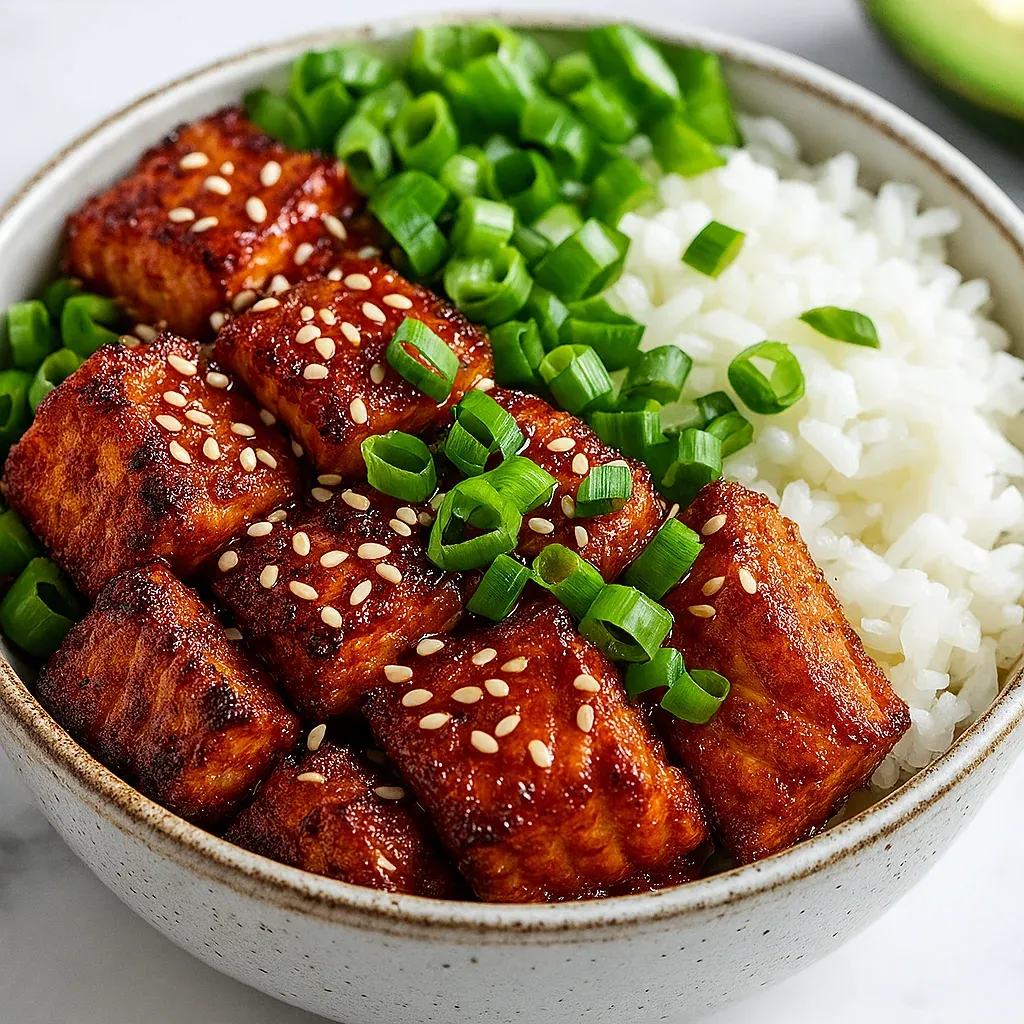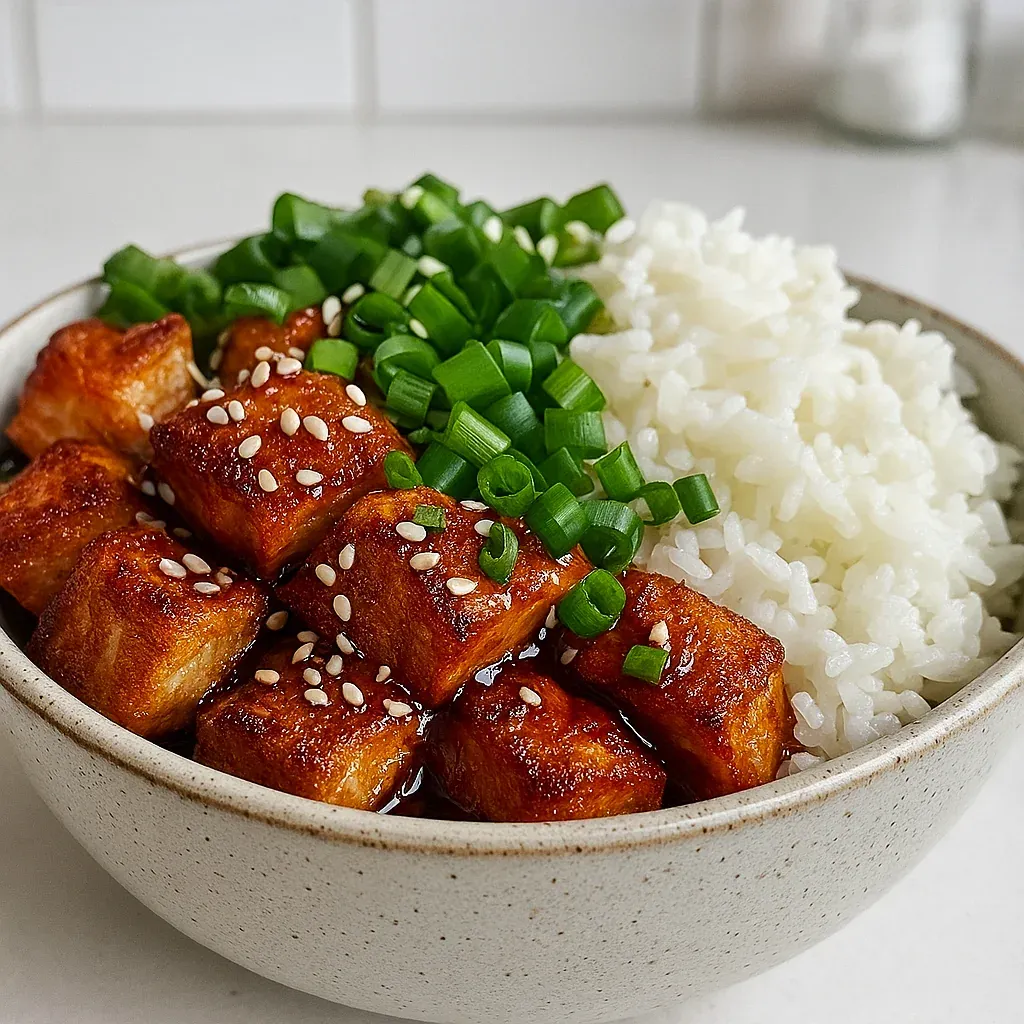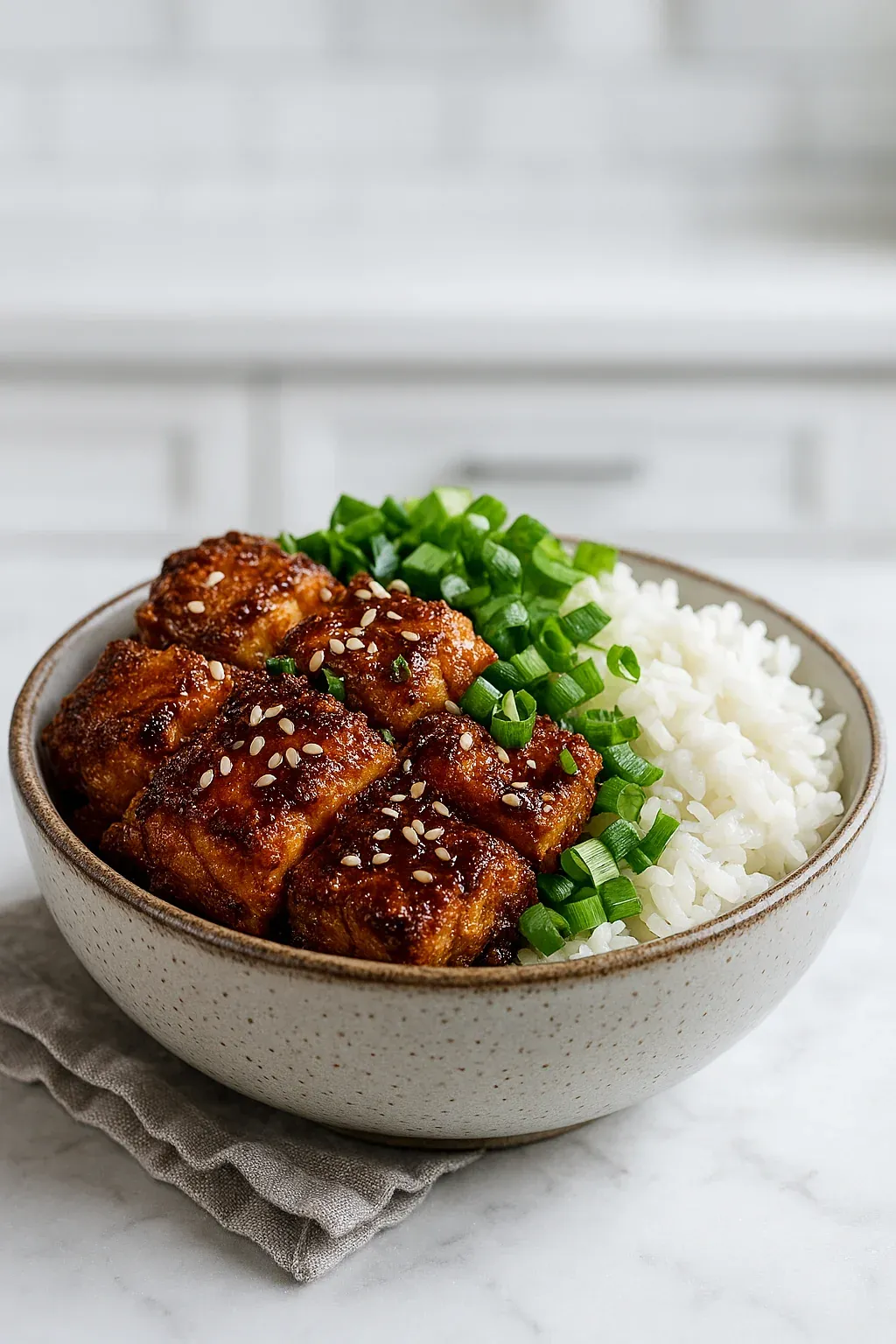 Pin it
Pin it
This hearty Crispy Salmon and Rice Bowl has become my go-to weeknight dinner when I want something that feels restaurant-quality without complicated techniques. The contrast between the crispy salmon skin and tender fish creates a texture experience that elevates a simple rice bowl into something truly special.
I first made this dish during a particularly busy week when I needed something quick but didn't want to sacrifice flavor. My family was so impressed they thought I had ordered takeout from our favorite seafood restaurant. Now it's in our regular rotation whenever wild salmon is available at the market.
Ingredients
- Salmon fillets with skin on: crucial for that irresistible crispy texture
- White, brown, or jasmine rice: forms the hearty base that soaks up all the flavors
- Fresh vegetables: like broccoli, carrots, or edamame add color, nutrition, and crunch
- Soy sauce: brings that essential umami depth that ties everything together
- Olive oil: helps achieve the perfect sear on the salmon
- Fresh lemon: brightens the entire dish with its acidity
- Minced garlic: provides aromatic foundation that enhances the salmon
Step-by-Step Instructions
- Preheat Your Pan:
- Heat a large skillet over medium high heat until it's very hot. This typically takes about 2 minutes. The pan needs to be properly heated to achieve that restaurant quality crispy skin. You can test the heat by sprinkling a few drops of water; if they dance and evaporate immediately the pan is ready.
- Prepare the Salmon:
- Take your salmon fillets and thoroughly pat them dry with paper towels. This step is absolutely crucial for achieving crispy skin as moisture is the enemy of crispiness. Season the fillets generously on both sides with salt and freshly ground black pepper. Drizzle a small amount of olive oil on the flesh side only; don't oil the skin.
- Sear the Salmon:
- Add a tablespoon of olive oil to the hot pan and immediately place the salmon skin side down. Press gently with a spatula for the first 30 seconds to ensure the skin makes full contact with the pan. Cook undisturbed for 4 to 5 minutes until the skin turns golden and crispy. Carefully flip the fillets and cook for another 3 to 4 minutes on the flesh side until the fish is cooked to your desired doneness. The center should be slightly translucent for medium.
- Prepare the Rice:
- While the salmon cooks, warm your pre-cooked rice in a microwave or separate pan. Once heated through, add a tablespoon of soy sauce and stir thoroughly to distribute the flavor. For extra flavor, you can add a teaspoon of minced garlic to the rice as it warms.
- Assemble Your Bowl:
- Start with a base of the seasoned rice in each bowl. Place the perfectly cooked salmon on top with the crispy skin facing upward to maintain its texture. Arrange your prepared vegetables around the salmon creating a colorful presentation. Finish with a generous squeeze of fresh lemon juice over the entire dish to brighten all the flavors.
I particularly love using wild-caught Alaskan salmon for this recipe when available. The slightly deeper flavor really shines against the simple seasonings. My daughter, who typically avoids fish, completely cleans her plate when I make this. She calls it the salmon that doesn't taste too 'fishy,' which is quite the compliment from a picky eater.
Storage Solutions
Storing this dish properly ensures you can enjoy leftovers without sacrificing quality. For best results store the salmon separately from the rice and vegetables. Place cooled salmon in an airtight container in the refrigerator for up to two days. The rice and vegetables can be stored together in another container for up to three days. When reheating, avoid the microwave for the salmon as it will make it rubbery. Instead, gently warm the salmon in a skillet over low heat until just heated through. The rice and vegetables can be microwaved with a splash of water to revive their texture.
 Pin it
Pin it
Simple Substitutions
Don't worry if you don't have every ingredient on hand; this recipe is incredibly forgiving. No salmon? Try using skin-on trout or even mackerel fillets for a similar effect. If you're out of fresh garlic, garlic powder works in a pinch though use about half the amount. For a gluten-free version, simply swap regular soy sauce for tamari or coconut aminos. And if rice isn't your preference, quinoa, cauliflower rice, or even soba noodles make excellent bases. The key is maintaining the balance of protein, starch, and vegetables regardless of which specific ingredients you choose.
Perfect Pairings
Elevate your meal by considering what to serve alongside your salmon bowl. A simple cucumber salad with rice vinegar creates a refreshing contrast to the rich salmon. For drinks, a crisp Sauvignon Blanc or light Pinot Noir complements the dish beautifully. If you're avoiding alcohol, sparkling water with a splash of yuzu or lemon juice offers a bright counterpoint. For dessert, consider something light like mochi ice cream or fresh berries with a touch of honey to cleanse the palate after the savory main course.
Cultural Context
This dish draws inspiration from Japanese donburi rice bowls, which traditionally feature a protein served over seasoned rice. The concept of creating a complete meal in a single bowl has roots in many Asian culinary traditions, valuing both efficiency and balance. The technique of crisping fish skin has been perfected in Japanese cuisine, where it's prized for its textural contrast. By combining these elements with Western ingredients and preparations, this recipe becomes a wonderful fusion dish that respects traditional techniques while embracing modern global flavors.
 Pin it
Pin it
Frequently Asked Questions
- → How do I get the salmon skin crispy?
To achieve crispy salmon skin, ensure the fillets are dry before seasoning. Use a hot pan with a little olive oil, place the fillets skin-side down, and avoid moving them for 4-5 minutes to allow proper searing.
- → Can I use a different type of fish?
Yes, you can substitute salmon with other fish, such as trout or mackerel. Adjust cooking times as needed to ensure the fish is cooked through.
- → What kind of rice works best?
Any cooked rice, such as jasmine, basmati, or brown rice, works well. Choose a variety that suits your taste or complements the dish's flavors.
- → How can I customize the flavors?
You can add spices like paprika or chili flakes for heat or drizzle sesame oil for an extra layer of flavor. Feel free to include your favorite vegetables for added variety.
- → How should I store leftovers?
Store leftovers in an airtight container for up to 2 days in the refrigerator. Reheat gently in a skillet or microwave to maintain texture and flavor.
